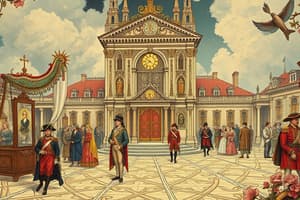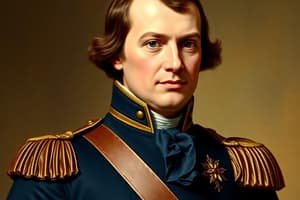Podcast
Questions and Answers
The French Revolution was an __________against the _____________ in France beginning _____________________ with the storming of the ____________, resulting in the establishment of a _______________ and ending in 1799 with the Consulate under _____________.
The French Revolution was an __________against the _____________ in France beginning _____________________ with the storming of the ____________, resulting in the establishment of a _______________ and ending in 1799 with the Consulate under _____________.
uprising, monarchy, 1789, Bastille, republic, Napoleon
Match the following terms with their descriptions:
Match the following terms with their descriptions:
taille = A land tax from which the nobility was exempt guillotine = A device used for executions during the French Revolution coup d’etat = A sudden seizure of power from the government Marie Antoinette = The Queen of France during the Revolution Bastille = A prison in Paris stormed at the beginning of the Revolution Robespierre = An influential figure during the Reign of Terror Third Estate = The common people of France bourgeoisie = The middle class sans culottes = The working class relics of feudalism = Traditional rights held by nobles Voltaire = An Enlightenment writer whose ideas influenced the revolution Waterloo = Site of Napoleon's final defeat National Assembly = Representatives from the Third Estate Napoleonic Civil Code = A body of French civil laws introduced in 1804 Corsica = Birthplace of Napoleon
Which of the following groups was part of the First Estate in pre-revolutionary France?
Which of the following groups was part of the First Estate in pre-revolutionary France?
- Artisans
- Nobles
- Clergy (correct)
- Peasants
Which group primarily comprised the Third Estate?
Which group primarily comprised the Third Estate?
The Second Estate consisted of members who always paid all the taxes in pre-revolutionary France.
The Second Estate consisted of members who always paid all the taxes in pre-revolutionary France.
What impact did the ideals of the Enlightenment have on the French Revolution?
What impact did the ideals of the Enlightenment have on the French Revolution?
In terms of political power, how did France change from before the Revolution to when Napoleon became Emperor?
In terms of political power, how did France change from before the Revolution to when Napoleon became Emperor?
Who supposedly said, 'I am the revolution'?
Who supposedly said, 'I am the revolution'?
What was the motto of the French Revolution?
What was the motto of the French Revolution?
Approximately, how many people were killed during the Reign of Terror?
Approximately, how many people were killed during the Reign of Terror?
On what day of the year do the French celebrate Bastille Day, and why is it a national holiday?
On what day of the year do the French celebrate Bastille Day, and why is it a national holiday?
Who is believed to have said – “let them eat cake.”?
Who is believed to have said – “let them eat cake.”?
The Estates System contributed to the start of the French Revolution?
The Estates System contributed to the start of the French Revolution?
Which of the following was a significant cause of the French Revolution?
Which of the following was a significant cause of the French Revolution?
Define the term 'relics of feudalism'.
Define the term 'relics of feudalism'.
Which of the following best describes the sans-culottes?
Which of the following best describes the sans-culottes?
What was an immediate result of the storming of the Bastille?
What was an immediate result of the storming of the Bastille?
Explain the significance of the Napoleonic Civil Code.
Explain the significance of the Napoleonic Civil Code.
Waterloo was where Napoleon conquered Europe.
Waterloo was where Napoleon conquered Europe.
Who was Robespierre?
Who was Robespierre?
Flashcards
Coup d'etat
Coup d'etat
A forced transfer of power, often illegal and usually involving the military.
Bastille
Bastille
A prison in Paris, its storming marked the beginning of the French Revolution.
Marie Antoinette
Marie Antoinette
Austrian wife of King Louis XVI; known for her extravagant lifestyle and alleged indifference to the suffering of the French commoners.
Robespierre
Robespierre
Signup and view all the flashcards
Third Estate
Third Estate
Signup and view all the flashcards
Bourgeoisie
Bourgeoisie
Signup and view all the flashcards
Sans culottes
Sans culottes
Signup and view all the flashcards
Taille
Taille
Signup and view all the flashcards
Napoleonic Civil Code
Napoleonic Civil Code
Signup and view all the flashcards
Waterloo
Waterloo
Signup and view all the flashcards
Guillotine
Guillotine
Signup and view all the flashcards
Relics of feudalism
Relics of feudalism
Signup and view all the flashcards
Voltaire
Voltaire
Signup and view all the flashcards
Enlightenment political ideas
Enlightenment political ideas
Signup and view all the flashcards
National Assembly
National Assembly
Signup and view all the flashcards
French Revolution motto
French Revolution motto
Signup and view all the flashcards
The Three Estates
The Three Estates
Signup and view all the flashcards
Study Notes
- The French Revolution was an uprising against the monarchy in France.
- It began in 1789 with the storming of the Bastille.
- It resulted in the establishment of a republic.
- It ended in 1799 with the Consulate under Napoleon.
Matching Section Key Terms
- taille: a land tax
- Waterloo: site of Napoleon's final defeat
- guillotine: device used for executions
- coup d’etat: a sudden seizure of power
- Marie Antoinette: Queen of France during the revolution
- National Assembly: a revolutionary assembly representing all the people of France
- Napoleonic Civil Code: French civil code established under Napoleon I in 1804
- Corsica: Napoleon's birthplace
- Bastille: a medieval fortress and prison in Paris
- Robespierre: a radical Jacobin leader and key figure during the Reign of Terror
- Third Estate: the commoners of France
- bourgeoisie: the middle class
- sans culottes: the common people of the lower classes
- relics of feudalism: rights and obligations of the aristocracy
- Voltaire: a French Enlightenment writer, historian, and philosopher
The Three Estates
- First Estate: clergy
- Included priests, bishops, and cardinals
- Did not pay taxes
- Second Estate: nobility
- Included nobles, king's niece, member of the Bourbon family
- Did not pay taxes
- Third Estate: commoners
- Included peasants, artisans, bourgeoisie, shop owners, carpenter, tax collector, physician
- Paid all the taxes
Essay Questions
- Adjectives to Describe the French Revolution:
- The revolution evolved over time
- Was the French Revolution successful?
- Consider the primary goals of the revolution and whether the political system in France changed from before the Revolution to when Napoleon became Emperor of France.
- The Enlightenment:
- Consider the main political ideas of the Enlightenment that inspired the French Revolution.
Short Answer Section
- "I am the revolution.": attributed to Napoleon.
- The Three Estates:
- Analyze the percentage of the population, percentage of land ownership, and tax payment responsibilities of each estate.
- Motto/Slogan:
- The motto/slogan of supporters of the French Revolution was "Liberté, égalité, fraternité" which translates to "Liberty, equality, fraternity".
- Reign of Terror:
- Thousands of people were killed during the Reign of Terror.
- Analyze the reasons for the violence during the Reign of Terror.
- Bastille Day:
- The French celebrate Bastille Day on July 14th.
- It commemorates the storming of the Bastille, a pivotal event in the French Revolution.
- "Let them eat cake":
- Attributed to Marie Antoinette
- It reflects a disconnect between the monarchy and the struggles of the common people.
Studying That Suits You
Use AI to generate personalized quizzes and flashcards to suit your learning preferences.




